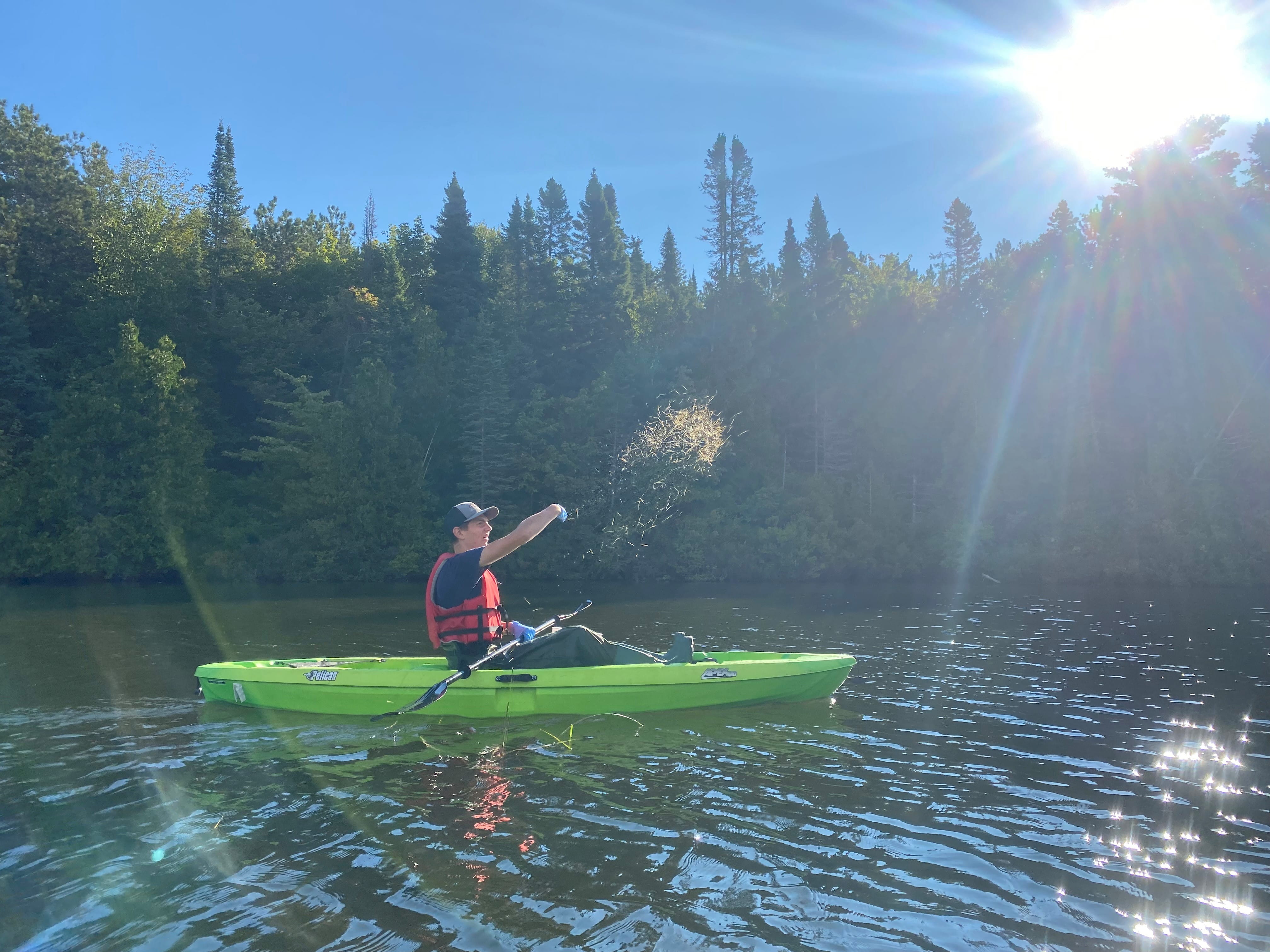The web Browser you are currently using is unsupported, and some features of this site may not work as intended. Please update to a modern browser such as Chrome, Firefox or Edge to experience all features Michigan.gov has to offer.
University looks to the lakes for educational inspiration
August 05, 2024
The College of Great Lakes Ecology and Education at Lake Superior State University (LSSU) marks a significant stride toward sustaining Michigan’s invaluable water resources.

Students in a high school natural resources career and technology class offered through LSSU’s Center for Freshwater Research and Education in the College of Great Lakes Ecology and Education help Bay Mills Indian Community plant manoomin, or wild rice, in an Upper Peninsula lake. Photo courtesy of LSSU.
The initiative, launched a year ago and encompassing the schools of Natural Resources and Education and the Center for Freshwater Research and Education, creates a new model of collaboration to train the next generation of educators and scientists while promoting the sustainability of cultural and natural resources in the Great Lakes basin.
The college is a shared vision leveraging LSSU’s place at the nexus of the upper Great Lakes to help sustain the region’s economy, culture, and way of life for future generations.
Located in Sault Ste. Marie at the confluence of the upper Great Lakes and straddling multinational borders, LSSU is uniquely poised to spearhead critical research and education. Its strategic location grants researchers and students direct access to the ecosystems of three Great Lakes (Superior, Huron, and Michigan) and multiple nations (U.S., Canada, Native American tribes, and First Nations), along with key partners, such as Algoma University, the U.S. Coast Guard’s National Center of Expertise for the Great Lakes, and the Michigan departments of Natural Resources (DNR) and Environment, Great Lakes, and Energy (EGLE).
The location along a multinational border also underlines the interconnected nature of environmental challenges, reinforcing the importance of cross-nation cooperation and of indigenous peoples’ knowledge and participation.
A novel component of the college’s mission is its dedication to place-based methodologies in education. This innovative approach builds a foundation for learning on the local environment, history, culture, and needs, creating a profound connection between students and their surroundings and increasing Great Lakes literacy.
Place-based education aligns teaching with real-world contexts, making learning more relevant and engaging for students. The goal is to build teacher education programs that empower aspiring teachers to bridge classroom learning with local natural and indigenous knowledge and connect student learning in their own backyards.
Immersing future educators in place-based techniques will instill a sense of responsibility and appreciation for the Great Lakes region, fostering educators who impart not only knowledge but also a deep-rooted understanding of the lakes’ significance in our culture and history.
Additionally, this new approach encourages an appreciation for diverse cultures and perspectives, which promotes skills needed to adapt teaching methods and content to support the needs of diverse student populations.
The College for Great Lakes Ecology and Education is home to cutting-edge facilities and resources, including the Richard and Theresa Barch Center for Freshwater Research and Education, which houses a Great Lakes Discovery Center for K-12 and community programs, along with state-of-the-art research laboratories to empower both aspiring educators and scientists.
College of Great Lakes Ecology and Education graduates will be better prepared to tackle the complex challenges that the Great Lakes region faces, advocating for impactful policies and engaging local communities in preserving the region’s cultural and ecological integrity.
As environmental concerns including climate change and water scarcity continue to grow, this college will be an innovative model of collaboration and education, leading the way to creating the next local and global leaders in education and natural resource conservation and management.
Many courses to chart
Lake Superior State University offers numerous degree programs through its College of the Great Lakes:
Bachelor’s degrees
- Teacher education, with an emphasis on placed-based learning/teaching.
- Fisheries and wildlife management (fisheries management, wildlife management, and conservation officer concentrations available).
- Conservation biology.
- Outdoor recreation and leadership (park and land management, outdoor recreation and ecotourism, and environmental education concentrations available.
Associate degrees
- Geospatial technology.
- Natural resources technology.
- Early childhood education.
Master’s degree
The college is preparing a new master’s degree program in fisheries and wildlife sciences to build on the resources of the university’s Center for Freshwater Research and Education.
Adapted from an article in the 2023 Michigan State of the Great Lakes Report by Ashley Moerke, Lake Superior State University.